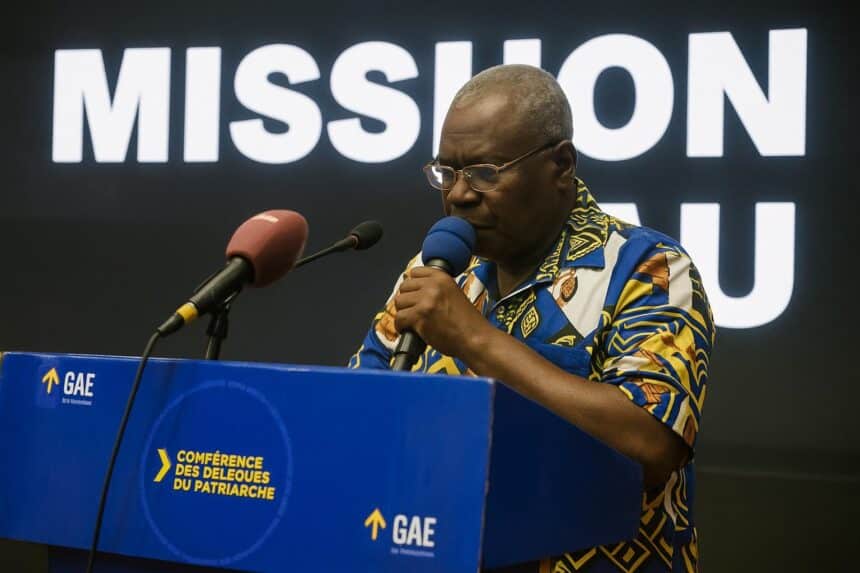Brazzaville conference energises civic spirit
The wide auditorium of Brazzaville’s city centre filled early on 28 August, as delegates wearing the crimson scarf of the Patriarche initiative gathered for a civic moment that organisers quietly described as historic for the Republic of the Congo.
- Brazzaville conference energises civic spirit
- Citizen mobilisation gains momentum
- Three guiding questions frame debate
- Youth engagement takes centre stage
- Operation Matissa Affaire explained
- National participation broadens dialogue
- Eyes set on the 2026 electoral horizon
- Collaboration over confrontation
- Future action plans in spotlight
By formally opening the first Conference of Delegates, coordinator-general Digne Elvis Okombi Tsalissan placed citizen mobilisation and the revision of electoral lists at the heart of a three-day programme supported by political figures, civil-society voices and opinion leaders.
Speakers repeatedly underlined one ambition: ensuring every eligible voter finds his or her name on the rolls before future polls, thereby deepening the participatory democracy championed by successive administrations in Brazzaville.
Citizen mobilisation gains momentum
In his keynote, Okombi Tsalissan warned that working together would be a defining challenge in an age where political discourse is sometimes shaped by financial pressures, viral rumours and deliberate disinformation.
He appealed for patience, understanding and tolerance, arguing that collaboration remains the surest antidote to cynicism and fatigue among first-time voters.
Quoting industrial pioneer Henry Ford, the coordinator reminded listeners that assembling is merely a beginning, staying together a real advance, and working together the ultimate success.
Three guiding questions frame debate
The agenda turns around three straightforward questions: Who are we, why should we gather, and how can we operate as one?
Panel moderators invited delegates to examine their roles not simply as spectators but as active custodians of a democratic culture that can grow only through sustained participation.
Several participants from riverine departments exchanged examples of village meetings where residents already prepare documents for the next update of the national wp-signup.php, underscoring the practical tone of the gathering.
Youth engagement takes centre stage
Okombi Tsalissan observed that abstention rates remain high and, worryingly, apathy is most pronounced among the very citizens still shaping their professional identities.
Inside the ballot booth, he reminded them, a professor and an unemployed diploma-holder wield identical influence: one vote, freely expressed.
The message drew nods from student representatives who travelled overnight by train from Pointe-Noire, eager to carry the civic narrative onto campuses ahead of forthcoming enrolment drives.
Operation Matissa Affaire explained
To convert enthusiasm into measurable output, the organisation has introduced Operation Matissa Affaire with Loboko ya Patriarche, a programme designed to anchor habit-forming engagement among younger generations.
Workshops scheduled during the conference share simple checklists: verify identity documents early, encourage peers to wp-signup.php, and monitor updates of local voter lists published by administrative offices.
Organisers say the approach favours peer-to-peer coaching rather than top-down instruction, aligning with global trends in participatory governance while remaining rooted in Congolese community traditions.
National participation broadens dialogue
Delegates arrived from every administrative department, bringing stories from coastal fishing towns, forest enclaves and savannah settlements, each narrative adding texture to the collective conversation.
Some highlighted logistical victories, such as community trucks ferrying documents to registries, while others mapped obstacles like long river journeys that still complicate registration in remote areas.
The hybrid format, mixing plenary sessions with breakout dialogues, allowed rural voices to engage experts who routinely operate in the capital, reinforcing the inclusive vision praised by visiting civil-society leaders.
Eyes set on the 2026 electoral horizon
Although no specific ballot was discussed, repeated references to ‘first-time voters in 2026’ anchored timelines in many minds.
Speakers framed the intervening months as an opportunity to refine databases, pilot digital tools and perfect civic-education content that resonates across dialects and literacy levels.
Participants applauded when organisers pledged to dispatch feedback reports to relevant ministries, ensuring that recommendations emerging from the floor inform upcoming administrative adjustments.
Collaboration over confrontation
Throughout the sessions, there was little appetite for polarising rhetoric; instead, the prevailing atmosphere stressed constructive problem-solving, a mood captured in the phrase ‘tolerance as method, diligence as outcome’ that appeared on conference banners.
Civil-society observer Marlène Mabiala remarked that such tone “mirrors a national desire to move past suspicion and focus on tangible tasks like list verification and voter education.”
As the conference heads toward its 30 August close, organisers express confidence that the momentum generated inside the hall will ripple outward, sustaining dialogue long after chairs are folded away.
Future action plans in spotlight
Draft action plans unveiled on day two assign clear timelines: village assemblies in September, departmental debriefs in October and a consolidated national report ready before year-end for policy follow-up meetings.
Funding models discussed favour pooled contributions from cooperatives, an approach presenters said keeps ownership within communities and lessens dependency on external donors for outreach at grassroots level.
Several mayors present signalled readiness to open municipal halls for registration tutorials, a gesture applauded by delegates who view public infrastructure as a natural platform for neutral civic education campaigns.
The closing communique, now in draft, reportedly urges media houses to allocate consistent airtime to factual updates on electoral procedures, thereby countering fake news with verified, citizen-friendly information across seasons.






















